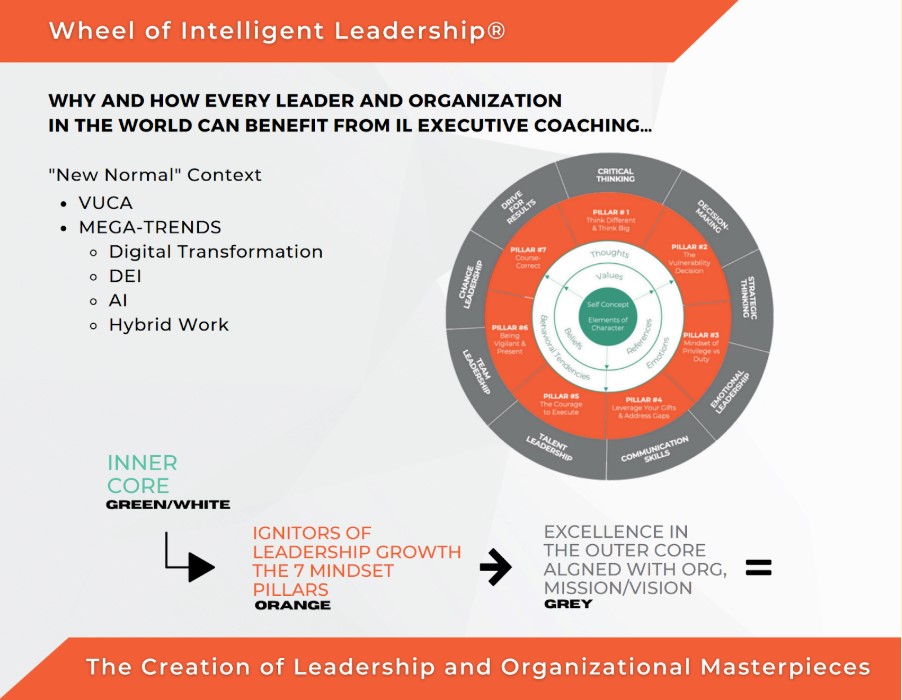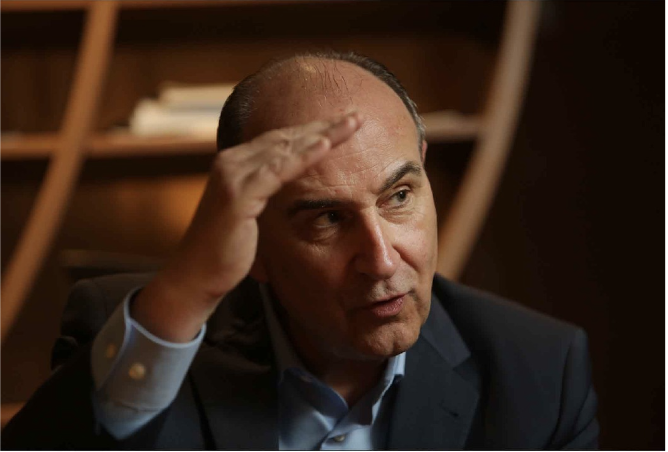THE WORLD’S #1 EXECUTIVE COACHING AND BUSINESS COACHING BLOG SINCE 2017.
How Critical Thinking Helps Leaders Work Through Problems
Published On: August 28, 2025 | Last updated on: November 24, 2025 | Author: John Mattone | Category: Blog, Critical Thinking

Critical thinking in leadership is not only about solving problems; it is about solving the right problems in the right way. By recognizing assumptions, evaluating evidence, and drawing sound conclusions, leaders sharpen their decision-making, strengthen accountability, and position their organizations to thrive amid complexity and change.
Most leaders intuitively link strong critical thinking skills with superior problem-solving and sustained performance. In my Intelligent Leadership framework, critical thinking is the first of the outer-core competencies, serving as the foundation for decision-making, problem-solving, and strategic thinking.
As I write in The Intelligent Leader, much of our thinking, when left unchecked, is “biased, distorted, partial, uninformed, or prejudiced.”
True leadership effectiveness begins when we take charge of our thinking, apply intellectual standards, and consider the full range of possibilities (emotional, cognitive, and psychological) before acting and engaging in meaningful discussions.
Modern organizations operate in an increasingly complex environment where leaders are under constant scrutiny.
Leadership accountability and sound judgment are essential for maintaining trust and building a thriving culture. Leaders who think critically make better choices, anticipate challenges, and sustain long-term growth.
Why Critical Thinking Matters More Than Ever
In an era shaped by artificial intelligence and constant disruption, strong critical thinking skills are a leader’s most powerful asset. A 2024 systematic review, Critical Thinking in the Age of AI, highlights how AI-driven complexity demands deeper human reasoning. Embracing critical thinking helps leaders think clearly, adapt quickly, and act decisively amid uncertainty.
AI can analyze data, but it cannot determine what is right or meaningful. That responsibility belongs to leaders who think critically and act with integrity. To navigate uncertainty and complexity, leaders must:
- Analyze wisely: Separate facts from assumptions and base decisions on verifiable evidence.
- Adapt quickly: Reframe complex challenges and adjust perspectives as conditions evolve.
- Decide with purpose: Align choices with core values, organizational mission, and long-term vision.
When leaders practice these habits, they sharpen clarity, strengthen resilience, and model disciplined reasoning throughout their organizations.
The power of critical thinking lies in helping leaders stay balanced and decisive, even when the future is uncertain.
Are Good Critical Thinking Skills Vital for Success?
Yes. In today’s complex global economy, strong critical thinking skills help leaders cut through bias and noise to make sound, data-driven decisions. By embracing critical thinking, leaders anticipate challenges, align strategy with purpose, and inspire innovative, values-based solutions that strengthen performance and leadership impact worldwide.
How Critical Thinking Strengthens Leadership
Critical thinking is an analytic approach to problem-solving and decision-making. By developing their critical thinking skills, leaders can improve their decision-making and enhance their organization’s position.
Leadership coaching can help leaders develop critical thinking, training their minds to think rather than merely memorize facts. This helps leaders anticipate the many potential consequences and outcomes of their strategic decisions and develop innovative solutions with their company.
Critical thinkers understand logical relationships and connect them with the “big picture” corporate vision and mission.
Critical Thinking in Leadership
In Intelligent Leadership, critical thinking drives clarity and results. It sharpens decision-making, aligns actions with purpose, and enhances strategic impact. A leader’s effectiveness mirrors the quality of their thought processes, making critical thinking a vital outer-core competency for achieving meaningful, goal-focused success.
Like Intelligent Leadership itself, it is reasoned, purposeful, and goal-focused. It allows leaders to formulate informed and relevant new ideas and inferences, solve problems, calculate probabilities, and make better decisions.
In my book, Intelligent Leadership, I have defined critical thinking as an essential outer-core leadership competency. Since leadership quality depends on the leader’s thought, critical thinking skills define a leader’s effectiveness.
The Cognitive Science Behind Leadership and Critical Thinking
Modern leaders must understand how the mind works. Drawing on Daniel Kahneman’s System 1 and System 2 thinking, effective leadership blends intuition with reflection. Cultivating critical thinking allows leaders to balance speed with depth, instinct with insight.
| Thinking System | Description | Leadership Application |
| System 1 – Intuitive | Fast, automatic, emotion-driven | Useful for quick responses and reading people |
| System 2 – Analytical | Slow, logical, deliberate | Enables sound reasoning and strategic clarity |
By strengthening analytical skills, leaders learn to pause, question assumptions, and adopt broader perspectives. Ultimately, critical thinking empowers individuals to unite intuition and reflection, making decisions that are both agile and wise.
What Does The Data Say? Critical Thinking for Leaders and Managers
From interviews and surveys of 150 human resources executives, experts estimated that only 1 to 28 percent of current leaders in their organizations demonstrated “excellent” critical thinking skills (Bonnie Hagemann and John Mattone for Pearson, 2011).
More recent studies echo similar findings: DDI’s Global Leadership Forecast 2023 reports that only 17 percent of leaders are rated highly effective in strategic thinking.
This quality data, across more than a decade, reveals that while tools and technologies have evolved, the foundational human capability to think critically and lead with clarity has not kept pace.
Critical thinking helps you distinguish between facts and assumptions.
Much of the instinctive thinking as a leader, if not carefully examined, tends to be biased, distorted, partial, uninformed, or even prejudiced.
The Emotional Side of Critical Thinking
According to a study published in the Pacific International Journal in 2024, emotions significantly influence critical thinking outcomes. Effective critical thinking requires evaluating all possible aspects of a problem, including emotional, cognitive, intellectual, and psychological factors.
Critical thinking is the opposite of instinctive thinking. Emotional intelligence, which complements critical thinking on the outer-core strategic competencies wheel, plays a critical role in the process.
It helps leaders manage their emotions and understand others’ emotions, thereby enhancing their ability to think critically and make effective decisions.
Critical Thinking vs Strategic Thinking
Critical thinking is the core component of strategic thinking, a less abstract measure of one’s ability to lead. In addition to strategic thinking, critical thinking allows leaders to:
- Embrace change
- Inspire others
- Create a vision and rally the “troops’ around it
- Understand how the different parts of the organization work together as a whole
The Impact of Thought Depth on Leadership
Shallow thinking by leaders is costly. It harms the organization, employees, and clients. Critical thinking enables leaders to apply their knowledge to the everyday challenges of their work. Thus, instead of walking-talking encyclopedias, they become valuable decision-making assets for their organizations and employees.
Effective leaders with strong critical thinking skills can model this behavior for their peers and reports, thereby further strengthening the company’s talent and leadership pool.
Common Cognitive Biases That Block Critical Thinking
Even high-performing leaders fall prey to hidden mental traps. Recognizing these biases is the first step toward clearer, more objective decision-making.
Leaders with strong critical thinking skills learn to detect and neutralize the subtle distortions that influence their choices:
- Confirmation Bias: Favoring information that validates existing views.
- Groupthink: Suppressing dissent to maintain consensus.
- Overconfidence: Trusting intuition over analysis.
- Availability Bias: Giving undue weight to recent events.
When leaders practice critical thinking, they develop the discipline to question assumptions and seek evidence beyond instinct. This openness to alternative viewpoints sharpens objectivity and builds cultures of thoughtful, inclusive leadership where truth, not convenience, guides decisions.
Are leaders born with critical thinking skills?
The answer is no. Critical thinking skills don’t come naturally to leaders. Even the top 5% of leaders, often considered natural-born leaders, have to work and develop critical thinking skills to use them effectively in the business world.
A 2016 study concluded that self-awareness helps leaders align their internal values with external actions. The learning process requires leaders to look “under the hood.” If we don’t understand what drives us and how we make decisions, we can overlook fundamental issues that could negatively impact our organization.
How can we cultivate critical thinkers?
As a leadership development coaching expert, I firmly believe that it is possible to learn and practice all inner and outer-core leadership competencies. That includes critical thinking.
In my executive coaching books and blog posts, I describe critical thinking as a disciplined process that enables leaders to improve the quality of their thoughts. It requires taking charge of how we think and applying high intellectual standards to our reasoning.
Drawing on Pearson’s RED model, which I integrate into my Intelligent Leadership framework, strong critical thinkers consistently practice three abilities:
- The ability to recognize assumptions
- The ability to evaluate arguments
- The ability to draw conclusions
These three behaviors form the heart of how intelligent leaders approach decisions, problems, and opportunities.
1. The Ability to Recognize Assumptions
As P.S. Delin and colleagues explain, an assumption is a belief accepted as true without proof, often shaped by personal bias or emotion. Facts are objective realities that stand independent of perception.
When leaders act on assumptions instead of evidence, they risk distortion, flawed judgment, and poor decisions.
Intelligent leaders cultivate awareness of their assumptions. They examine how beliefs and past experiences shape their interpretations. They also encourage open dialogue that surfaces hidden biases and challenges established thinking.
This openness allows them to close information gaps and see issues more clearly.
2. The Ability to Evaluate Arguments
Strong critical thinkers analyze information and arguments with objectivity. They separate fact from opinion, look for gaps in logic, and seek evidence that tests rather than confirms their views.
In practice, this means reducing complex challenges to their essential elements and assessing evidence from multiple perspectives. Leaders who think this way are less likely to fall victim to emotional reactions or confirmation bias.
Instead, they create a balanced foundation for fair and rational decisions that serve both organizational and ethical goals.
3. The Ability to Draw Conclusions
Drawing conclusions is the disciplined act of integrating information into reasoned judgment. Intelligent leaders evaluate all relevant data, consider the plausibility of multiple outcomes, and select the course of action best supported by evidence.
This process requires both patience and courage. It also demands humility, since no conclusion is ever final. Effective leaders revisit their decisions as new evidence emerges and adjust their practical strategies accordingly.
According to research published in the Journal of Leadership Education, executive coaching can strengthen critical thinking by developing the sub-skills that underpin it: self-awareness, reflection, and disciplined reasoning.
Critical thinking is a foundational outer-core competency within my Intelligent Leadership framework. It fuels effective decision-making, problem-solving, and strategic thinking. These are the capabilities that set exceptional leaders apart.
Critical thinking is an essential competency of John Mattone’s Intelligent Leadership framework.
From Critical Thinking to Problem-Solving and Decision-Making
In The Intelligent Leader, I teach that a leader’s problem-solving and decision-making are entirely based on their critical thinking. When leaders apply the RED model with discipline and self-awareness, they bring greater clarity, logic, and confidence to complex challenges.
Problem-solving, in this sense, is not a separate process but the application of critical thinking.
Intelligent leaders begin by recognizing assumptions that may cloud their understanding. They evaluate arguments objectively, considering both rational and emotional factors. They then draw sound conclusions, act on them with integrity, and reflect on results to strengthen future reasoning.
This cycle of reasoning and reflection links directly to the inner and outer core dimensions of Intelligent Leadership. The inner core fuels the outer-core behaviors that define excellence in thinking and execution.
When inner strength supports analytical rigor, leaders achieve both clarity and authenticity in their decision-making.
Building a Culture of Critical Thinking Across the Organization
When leaders embrace the critical thinking process, they elevate performance and shape culture. By modeling curiosity, humility, and reflection, core traits of strong inner-core leadership, they inspire others to question assumptions and foster deeper understanding. This mindset soon spreads, creating a culture of clarity, innovation, and purposeful decision-making.
Practical ways to strengthen this culture include:
- Encourage open debate: Welcome diverse perspectives and respectful disagreement.
- Reward thoughtful risk-taking: Celebrate learning and progress, not just outcomes.
- Model curiosity and humility: Demonstrate that asking questions and challenging ideas reflect strength, not weakness.
When teams practice critical thinking through open dialogue, project reviews, and shared reflection, collaboration deepens and innovation flourishes.
Over time, this mindset becomes an organizational habit. It creates a way of thinking that drives integrity, growth, and sustainable excellence.
How Leadership Coaching Can Help Develop Critical Thinking Skills
Leadership coaching, at least the way I understand it, views critical thinking as one of the fundamental levers through which it can effect meaningful, sustainable, positive change.
Business and executive coaching professionals work with leaders, helping them assess their existing critical thinking skills, provide practical solutions to improve them, and measure their progress.
How Coaching Strengthens Critical Thinking
Executive leadership coaching can help develop and train critical thinking skills in many ways:
- A leadership coach can give you an objective assessment of your current critical thinking skills.
- Executive coaches know how to ask the right questions to steer their coachees onto the path of improvement.
- Leadership coaching considers self-awareness and emotional intelligence the cornerstones of intelligent leadership. Self-aware and emotionally intelligent leaders understand the value of different perspectives.
- Business coaching encourages leaders to understand the strategic drivers of success for their organization in practical, financial terms.
- Coaches can provide valuable input, critique, and opinions, introducing alternative perspectives and improving their clients’ decision-making skills.
Final Thoughts
Unlock your leadership potential with Intelligent Leadership Executive Coaching. Strengthen essential skills to be a good leader, such as self-awareness, servant leadership, and resilience, the same timeless qualities that defined Gandhi’s remarkable impact.
Book your complimentary discovery session today and take the first step toward transformative, values-driven leadership.









